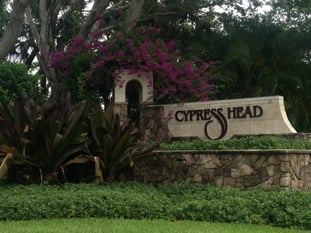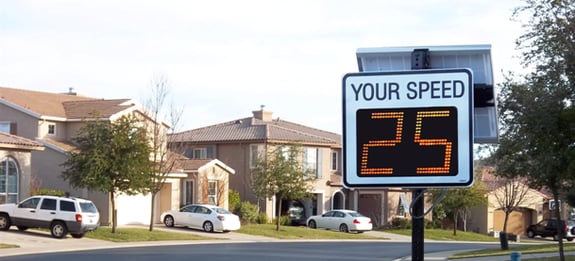Cypress Head is a large, very active lifestyle community in Parkland. Although there is a speed limit in place of 25 MPH within the community, there were growing complaints of excessive speeding, especially as the community was built without sidewalks. Many residents complained that the association was not doing enough to control speeding within the neighborhood. The board of directors knew they had to act and began considering their options.
The initial options that the board of directors considered were:
 Having a security company issue traffic citations within the community. Of the 100 hours a week spent patrolling the community, only 15% of that time was spent on traffic enforcement and an average of only 10 traffic citations per month were being issued. On top of this, there were often confrontations between homeowners and the security. The board decided to no longer continue having the security company handle traffic enforcement.
Having a security company issue traffic citations within the community. Of the 100 hours a week spent patrolling the community, only 15% of that time was spent on traffic enforcement and an average of only 10 traffic citations per month were being issued. On top of this, there were often confrontations between homeowners and the security. The board decided to no longer continue having the security company handle traffic enforcement.- In 2019 a traffic engineer was hired to conduct a traffic study. This traffic study suggested the installation of speed humps throughout the community. The board met with the city commissioner to discuss the installation of the speed humps or speed tables. It was finally determined that the speed humps would be punitive for those that don’t generally speed.
- A third option was that the Broward sheriff department set up numerous speed traps and radar signs. However, BSO issues speeding tickets that carry fines and points against your license. BSO can also write infractions for all other unlawful driving. This option was also declined.
After considering the above options, the board looked elsewhere and consulted with Campbell to find the best solution to the speeding issue. Having had success in other Campbell communities that implemented it, the Cypress Head board decided to also implement Traffic Logix speeding cameras.
Using information gathered from the traffic study, the board decided to strategically place six poles in locations around the community. Each location would be wired with a power source, as Traffic Logix cameras are not battery operated. They decided to purchase four cameras for active use and two dummy cameras. Camera placement could be moved from time to time to offer coverage in high traffic areas and target zones.
Implementation of the Traffic Logix system required a variety of initial costs, including the purchase of six cameras. There also had to be installation of poles for the cameras, plus electrician work. This included 6 poles, 6 service racks and outlets on each of the poles. Additionally, deposits needed to be paid to FPL for 6 new meters tied to the poles.
Also considered were the annual expenses related to the Traffic Logix speeding project. Because Traffic Logix uses a cloud service to store the data captured on the cameras, there is an annual cost for the cloud-based service. There are also costs related to the FPL meters and the admin labor of 20 hours per week to issue the speeding violations.
To recover the costs of the project and to begin issuing fines, the board of directors had to adopt a fine schedule. The goal of the schedule was not to provide a revenue stream but rather to reduce speeding in the neighborhood. The fine schedule is meant to be aggressive, fair, and efficient. During the first 30 days to acclimate the residents to the new fining schedule, only warnings were issued. The only exception to this rule was gross negligence.
After having the Traffic Logix speeding project up and running for the entirety of 2021, the community collected enough revenue to cover the initial project costs, and more, in less than 12 months. However, the amount collected over that period was only about 22% of the total amount billed through violation letters. This has mostly to due with the fact that 97% of speeders in the community consist of non-residents, which are more difficult to collect the violation fines from. The board of directors continue to evaluate how to improve collections moving forward.
Nonetheless, the speeding project with Traffic Logix has been a tremendous success for the community. By comparing the data from the initial traffic study in 2019 versus a speeding report in May of 2022, the board determined that there was a 74% to 79% reduction in speeding throughout various roads in the community. The board of directors at Cypress Head listened to the concerns of their residents and considered speeding very seriously. The safety and well-being of Cypress Head Residents is the board’s #1 priority.
